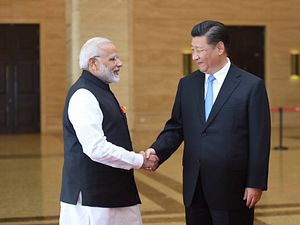U.S. President Donald Trump’s lukewarm approach toward Japan has compelled the latter to explore the possibility of improving ties with Beijing. Of late, there seems to be a desire on both sides to work jointly on a number of important issues — strategic and economic — such as North Korea and the impact of Trump’s tariffs on both economies.
During Chinese Foreign Minister Wang Yi’s recent visit to Japan — which happened to be the first visit in nine years, by a Chinese foreign minister to the country — both Japan and China spoke about the need for working jointly on the North Korea issue.
Japanese Foreign Minister Taro Kono commented on the understanding reached between both sides, saying “To establish a complete, irreversible and verifiable denuclearization of North Korea we agreed to continue to fully implement all relevant U.N. resolutions and to work closely together.”
Interestingly, the China-Japan Economic Dialogue was held after a period of eight years. Apart from the issue of U.S. tariffs, both Japan and China also decided to work jointly for strengthening globalization, which has benefitted both countries.
What was especially important was the fact that both sides discussed the possibility of cooperation in infrastructure projects in third countries. In fact, Wang invited Japan to consider participating in the Belt and Road Initiative (BRI). Kono said that his country was open to participating in those parts of the project which were in sync with standards of the international community.
Japanese Prime Minister Shinzo Abe, while addressing Japanese and Chinese executives in Tokyo a few months ago alluded to the possibility of Japanese participation in the BRI. “I believe Japan will be able to cooperate well with China, which has been putting forward its One Belt One Road initiative,” he said.
Abe stated that this could only be done in a “free and open Indo-Pacific.” While stating that such cooperation would benefit the people of Asia, Abe also made the point that China needed to ensure that its projects are more transparent.
Significantly, Japan has also said that it is not opposed to the China-Pakistan Economic Corridor (CPEC), which is the main bone of contention between China and India. Japanese Ambassador to Pakistan Takashi Kurai at a lecture delivered at the Institute of Strategic Studies Islamabad in November 2017 said, “We are not against CPEC, we appreciate this initiative but, at the same time, we believe whatever project is carried out should be based on transparency, openness, accountability. We have made it clear that we may be open to help in furthering this project.”
Japan’s openness towards the BRI is interesting because it has also put forward alternative narratives, such as the Partnership for Quality Infrastructure (PQI) in which India and Japan are partners. Both countries are working on ambitious projects like the Asia-Africa Growth Corridor. Even under the framework of the “Indo-Pacific Strategy,” Japan is seeking to work with other member countries of the Quad (the U.S., India, Australia) on important infrastructure projects.
What Does This Mean for India?
Japan’s openness towards the BRI holds important lessons for India, namely that it should not be closed toward concept. Over the past few months, some important steps have been taken to bring the India-China relationship back on track, the most important and decisive being Prime Minister Narendra Modi’s recent visit to China for an informal meeting with Chinese President Xi Jinping at Wuhan.
Xi Jinping said “China and India are both important engines for global growth and we are central pillars for promoting a multi-polar and globalized world.”
Modi echoed Xi’s view, saying that greater cooperation was imperative. “As India and China represented 40 percent of the world’s population, they need to try to work together to tackle global problems,” Modi said.
It is unlikely that differences over the BRI project are going to be resolved easily, though some incremental progress could be made. For example, both sides spoke about the possibility of a joint project in Afghanistan.
The key objection of India to the BRI is CPEC, which passes through disputed territory. New Delhi has put forward its apprehensions on the issue on more than one occasion. Beijing had said that it was willing to address India’s concerns and rework the project. During the Boao Forum Xi stated that China is willing to address the apprehensions of other countries regarding the BRI and maintained that it is not targeted toward any country.
During the 5th Strategic and Economic Dialogue in Beijing, China did not give a convincing response to the Indian side. India, for its part, did not support a communique released after a meeting of the Shanghai Cooperation Organization (SCO) group’s foreign ministers in Beijing.
As a consequence of tensions with China and differences over CPEC, India has also been lukewarm with regard to the Bangladesh-China-India-Myanmar (BCIM) Corridor. Discussions with regard to this project have been ongoing between academics from India and China for nearly two decades. China insists that BCIM is a part of BRI; India says it predates Beijing’s initiative.
Nevertheless, New Delhi should not be totally closed to the project as it could benefit India, especially eastern India, and complement New Delhi’s Act East Policy. Beijing has reached out to West Bengal (Kunming and Kolkata have sister city status), and even invited the West Bengal Chief Minister to visit China in 2017, though the visit did not happen.
In conclusion, India which has sought to rework ties with China, would do well to learn from Japan and not remain totally closed to the BRI. New Delhi should exhibit a degree of pragmatism with regard to the BRI and invite domestic stakeholders (especially state governments like West Bengal which could benefit from projects like the BCIM) on board. The Indo-Pacific region is witnessing significant changes, and rigidity serves no one’s purpose.
Tridivesh Singh Maini is a New Delhi-based policy analyst associated with the Jindal School of International Affairs, OP Jindal Global University, Sonipat.
































